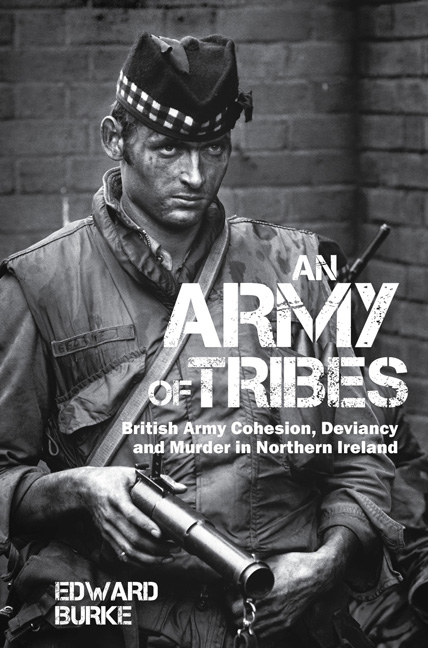Book contents
- Frontmatter
- Contents
- Preface
- Acknowledgements
- List of Abbreviations
- Maps
- Introduction
- 1 The British Army Before 1971
- 2 The Political and Operational Environment in Northern Ireland, 1969–1972
- 3 The Scots Guards and Argyll and Sutherland Highlanders Regiments in Northern Ireland, 1971–1972
- 4 Murder: The Killing of Michael Naan and Andrew Murray
- Conclusion
- Bibliography
- Index
4 - Murder: The Killing of Michael Naan and Andrew Murray
- Frontmatter
- Contents
- Preface
- Acknowledgements
- List of Abbreviations
- Maps
- Introduction
- 1 The British Army Before 1971
- 2 The Political and Operational Environment in Northern Ireland, 1969–1972
- 3 The Scots Guards and Argyll and Sutherland Highlanders Regiments in Northern Ireland, 1971–1972
- 4 Murder: The Killing of Michael Naan and Andrew Murray
- Conclusion
- Bibliography
- Index
Summary
Vengeance is mine; I will repay, saith the Lord.
On the night of October 24, 1972, the Battalion Watchkeeper for the 16th/5th The Queen's Royal Lancers, the 3rd Infantry Brigade unit with lead responsibility for security in RUC L Division (Fermanagh and South Tyrone), typed a simple but shocking entry into the Battalion Log: ‘At 1830 a Mr. T P Hannah reported to the Newtownbutler RUC that he had found two bodies at NANN's [sic] farm. The bodies found were that of: Michael Nann 31 (RC) Andrew Murray 24 (RC). Both had been stabbed to death with a hay fork.’ News of the ‘pitchfork murders’ of farmer, and occasional civil rights activist, Michael Naan and farm labourer Andrew Murray at an isolated farm in the townland of Aughnahinch, just south of the rural village of Newtownbutler (population approximately 1,000), spread fear through Fermanagh and across the nearby border in Counties Cavan and Monaghan. Like the Lancers, locals believed that Naan and Murray had been murdered in a frenzied attack with a pitchfork. In the days after the murders, a local newspaper, the Anglo-Celt, reported that, ‘As there was no sign of a struggle, it is believed that the two victims were surrounded by men with pitchforks and had no chance either to resist or escape.’ Local Catholics initially believed that the killings were a Loyalist response to the fatal shooting in an IRA ambush of Michael Naan's neighbour and part-time UDR soldier, Private Robin Bell, on October 22.
The murders of Michael Naan and Andrew Murray appeared to be eerily reminiscent of another dark chapter in Fermanagh's history, ‘The Mackan Fight’, an incident that has been handed down through the folklore and whispered warnings of successive generations. On that occasion, during a clash with Orangemen on their traditional annual celebration of the Battle of the Boyne on July 12, 1829, a local Catholic, Ignatius McManus, ‘twice stabbed Robert Mealey with a pitchfork’. Four local Protestant men were killed at Macken: ‘The affair has come down in tradition as a great Catholic victory.’ Were Naan and Murray now paying a belated debt in blood for this ‘victory’? Was the choice of a pitchfork as the murder weapon deliberate? Even in an era marked by sectarian atrocity, the people of Newtownbutler were deeply shocked by the apparent brutality of Naan and Murray's deaths; some feared for their lives.
- Type
- Chapter
- Information
- An Army of TribesBritish Army Cohesion, Deviancy and Murder in Northern Ireland, pp. 227 - 332Publisher: Liverpool University PressPrint publication year: 2018



